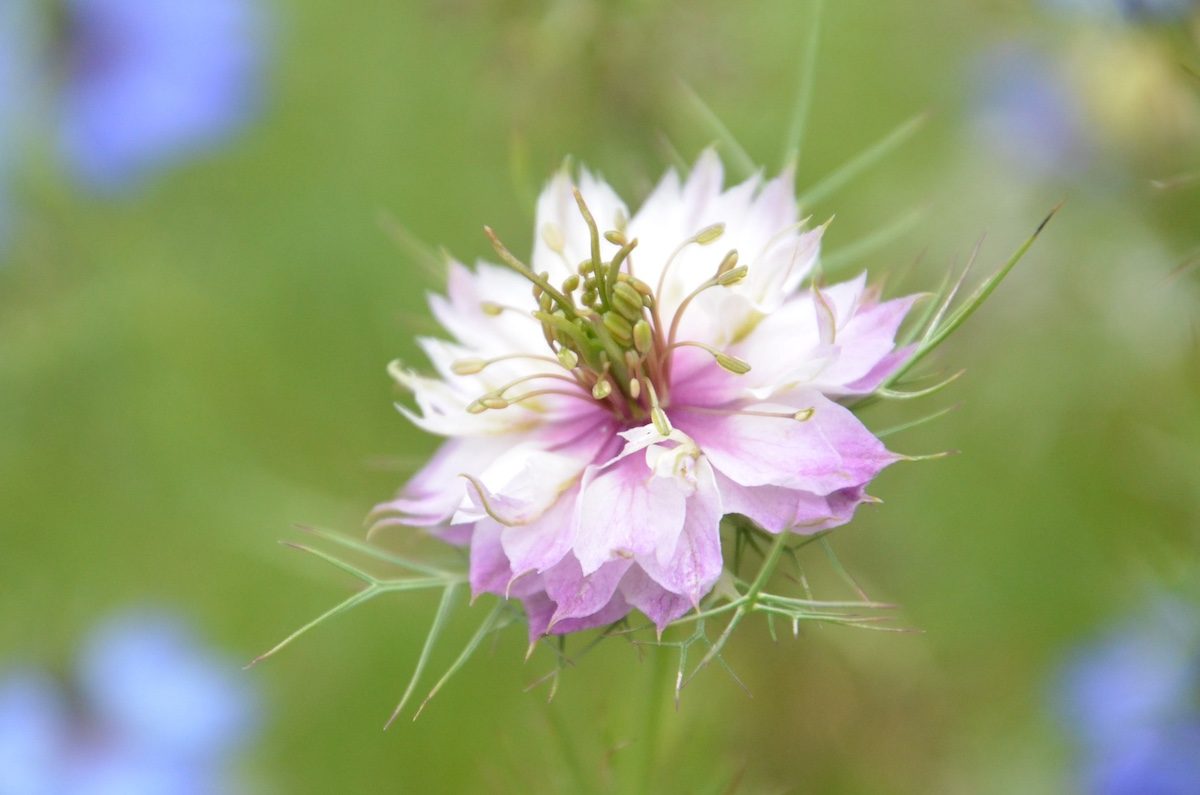For a unique, easy-to-grow annual that blooms early in spring, add love-in-a-mist to your garden. Learn how to grow this eye-catching flower.

Love-in-a-Mist Flower Care and Growing Tips

On This Page
How to Grow Love-in-a-Mist Flowers

- Common names: love-in-a-mist, devil in the bush
- Scientific name: Nigella damascena
- Hardiness zones: Annual but readily self-sows
- Light needs: Full or part sun
- Watering needs: Needs consistent moisture; does not tolerate constant heat
- Preferred soil: Well-draining
- Size: 15 to 24 inches height, 12 inches wide
- Pollinators: Bees
- Toxic: Yes — all parts of plant are toxic to humans
You’ll love adding love-in-a-mist to your garden! Known for being easy to grow, the flowers — the “love” in the name — are surrounded by reedy, spiky-looking foliage, which creates the “mist.” Blooms range from light blue to pink, white, or purple depending on the variety.
Add love-in-a-mist to your cutting garden. The flowers are great for bouquets.
When Does Love-in-a-Mist Bloom?

Sow seeds as soon as you can work the soil for gardening. Flowering in spring and into summer, this annual grows best in full sun (although it will tolerate part sun, with fewer flowers) and in well-draining soil. It reaches heights of up to 24 inches, and it can grow a foot wide. The flowers bring in plenty of pollinators during spring and summer.
Note that the flowers bloom for two months at most, so if you want to have more flowers later in the growing season, you’ll need to plant seeds again in summer.
Check out the top 10 old old-fashioned flowers for your garden.
Love-in-a-Mist Seedpods

“The flowers and seedpods of this plant are unique. What is it called? Should I harvest the seeds to replant, or will it come back on its own?” asks Birds & Blooms reader Pat Murphy of Greenwald, Minnesota.
Gardening expert Melinda Myers says, “Your surprise plant is the cool-weather annual known as love-in-a-mist (Nigella damascena). It self-seeds, so just leave a few pods on the plant to dry, break open and release seeds for next year’s garden. You can also collect a few if you want to lend nature a hand or start another planting elsewhere.
The blooms make lovely cut flowers, and the dried seedpods are perfect for vases and wreaths. Grow this plant in full sun and keep the soil consistently moist for best results.”
Sources
- Wisconsin Horticulture, “Love-in-a-Mist, Nigella damascena“
About the Expert
Melinda Myers is the official gardening expert for Birds & Blooms. She is a TV/radio host, author and columnist who has written more than 20 gardening books. Melinda earned a master’s degree in horticulture from the University of Wisconsin-Madison.




















